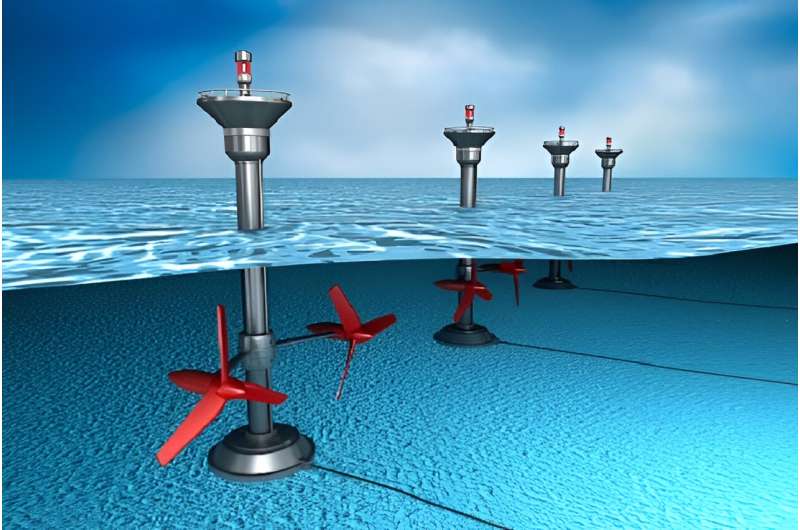This article has been reviewed according to Science X's editorial process and policies. Editors have highlighted the following attributes while ensuring the content's credibility:
fact-checked
trusted source
proofread
Study examines impact of noise from green energy technologies on fish and sea life

A University of Liverpool researcher has contributed to a study which examines how noise from marine energy converters (MECs)—such as tidal turbines and wave energy converters—might affect fish and aquatic invertebrates. The work also identifies major data gaps regarding the acoustics of MECs and their potential impacts.
In a paper, "Marine energy converters: Potential acoustic effects on fishes and aquatic invertebrates," published in The Journal of the Acoustical Society of America, researchers present an analysis and prioritization of research needs regarding the impact of MECs which are typically located in shallower waters than offshore wind farms.
Dr. Louise Roberts, lecturer in marine biology with the University of Liverpool's Department of Earth, Ocean and Ecological Sciences, worked with researchers from across North America and the UK on the study.
While the effects of MECs have been well documented for marine mammals, far fewer studies have focused on fishes and invertebrates.
Most fishes and aquatic invertebrates "feel" sound using water particle motion and vibrations in the ocean floor. Since many MECs directly contact the seafloor, the vibrational noise produced could have a particular impact on bottom-dwelling animals.
The researchers identify a substantial number of data gaps regarding the bioacoustics of fishes and invertebrates, and the sounds and substrate vibrations produced by MECs.
They call for future studies to include analysis and measurement of the noises produced, alongside biological experiments focused upon detection capabilities and behavior of species which live in the vicinity of MEC devices. Acoustic criteria to protect fishes and invertebrates from sources need to be further developed, underpinned by experiments in the field and the laboratory.
Dr. Louise Roberts said, "With a climate emergency we are quite rightly exploring green energy sources. However, we must consider the impact of these solutions on the environment in which they are placed.
"Fishes and invertebrates are fundamental to marine food webs, and are often overlooked when investigating the impacts of sounds in the environment. Here we hope to raise awareness of this issue, and this work could direct future designs of devices and associated policies."
More information: Arthur N. Popper et al, Marine energy converters: Potential acoustic effects on fishes and aquatic invertebrates, The Journal of the Acoustical Society of America (2023). DOI: 10.1121/10.0020150
Provided by University of Liverpool




















